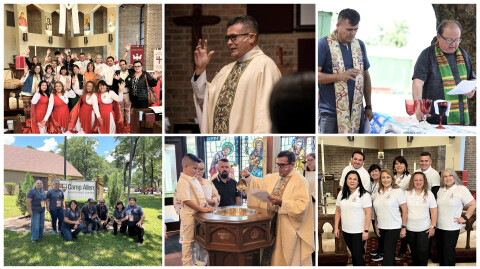The Wiseman gets off the bus with the other ghosts. We’ve met him briefly in the bus because he imparts great wisdom on the narrator of C.S. Lewis’ imaginary tale,The Great Divorce, (which we are reading in our Sunday 1:00 pm study. Join us on Zoom!) The bus traveled a long distance from the grey town to a divine place with streets paved with diamonds and perfectly clear rivers that allow a magical view of every pebble at the bottom. Upon arrival, the contentious and angry passengers, which represent the seven deathly sins of sloth, pride, wrath, gluttony, lust, greed, and envy prepare to meet their hosts, called The Bright People. These hosts have been sent to welcome the new arrivals and bring them to the place on the mountains where they will be given new “substantial” bodies, and join a perfected reality in God’s own presence.
The Wiseman’s spirit is met by Dick, a Bright Person who was a one-time colleague on earth. “My dear boy, I’m delighted to see you,” says the spirit with honest gladness. He considers himself an honest spirit. In fact, intellectual honesty was his best attribute as an intellectual of renown when he was alive. “I shall never forget some of our talks,” he tells Dick. But then he laments, “I expect you’ve changed your views a bit since then. You became rather narrow-minded towards the end of your life... Why, my dear boy, you were coming to believe in a literal Heaven and Hell!” He then claims that he also believes in the Kingdom, but “nothing superstitious or mythological.”
As the conversation progresses, the reader is allowed to perceive how the Wiseman’s view of the Kingdom is nothing but an abstract, intellectual, and even theological idea, that is not based on any real faith in a risen Messiah. In fact, he says as much. “When the doctrine of the Resurrection ceased to commend itself to the critical faculties which God had given me, I openly rejected it... I took every risk.” Dick challenges him by affirming that his was not a risk at all. He was merely recycling old ideas from liberal Christianity, packaged in a new way. Sadly, the world received his re-packaged apostasy with such great affection that he became a best-selling author and a Bishop.
The Wiseman started at the simple place of a child’s faith, but the more he studied, the more he approached a place of honest disbelief. The more theology he learned, the more he lost his faith, until he came to a completely nebulous and intellectual set of thoughts and ideas disconnected from Historical Christianity. Sadly, Dick asks him, “When did we put up one moment’s real resistance to the loss of our faith?” The man had convinced himself that Heaven and Hell did not exist in any real way, and that all that existed was the intellectual (spiritual) hope of light, “with its field for indefinite progress.”
Proud of the sincerity of his opinions, the Wiseman refuses to accept that our opinions can ever condemn us, as long as they are honest, which means deeply held. Dick corrects him by reminding him that not all honest opinions are innocent. He then invites the man to repent and believe, since he has been in Hell (grey town) and now stands at the threshold of Heaven. The rather arrogant Bishop will only follow if he “finds an atmosphere of free inquiry” where his intellect will be useful. He wants to be needed. Dick responds, “No scope for your talents: only forgiveness for having perverted them.” Sadly, the Bishop affirms, “my religion is very real and a very precious thing to me.”
After this dialogue, the Bishop remembers that he needs to return to grey town to read a paper about the founder of Christianity. He will lead his students into a conversation about what Christianity might have become if its founder hadn’t died at a young age. The Bishop is convinced that Jesus would have changed some of his rather immature ideas. Study and cultivation of the mind lead to enlightenment, and Christianity would have been very different if its founder had been allowed to live to an old age. After this, he makes the decision to return to a world of shadows and lies, rather than making the journey to a world filled with light and love.
We are surrounded by wisemen and wisewomen in our Church today, and I often wonder if all our fertile theologizing is bringing us into a closer relationship with a crucified Messiah, who died a real death, rose from the dead, ascended to the Father, and will come again one day to bring us fully into himself. Now, I must confess that Ivory-Tower theology, with all its lofty ideas about God as luminosity and ground of our being, is fascinating to read. But this theology has nothing to offer unless it leads us into love and service of God and neighbor. I believe it was Lewis who said, “Christianity is either a relationship with a real person or it is nothing more than a head trip.” Honest opinions can be wrong and can lead to a lot of pain. Paul knew this when he affirmed that in this world we see reality as if through a dirty glass. A person can be a deep thinker and a white-supremacist at the same time!
The only religious belief worth waking up for in the morning is the belief in the infinite love of a benevolent God, whose Son is the only Savior of the world, and whose forgiveness for all is the Good News the world needs today.
May he continue to bless you,
Fr. Roman+





